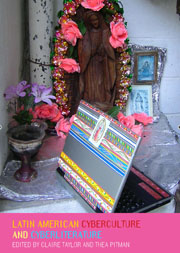Book contents
- Frontmatter
- Contents
- List of Illustrations
- Acknowledgements
- Foreword: Latin American Cyberliterature: From the Lettered City to the Creativity of its Citizens
- Notes on Contributors
- Introduction
- I Cyberculture and Cybercommunities
- II Cyberliterature: Avatars and Aficionados
- 9 Posthumanism in the Work of Jorge Luis Borges
- 10 Julio Cortázar's Rayuela and the Challenges of Cyberliterature
- 11 Contemporary Brazilian Fiction: Between Screens and Printed Pages
- 12 Creative Processes in Hypermedia Literature: Single Purpose, Multiple Authors
- 13 Hypertext in Context: Space and Time in the Hypertext and Hypermedia Fictions of Blas Valdez and Doménico Chiappe
- 14 Virtual Bodies in Cyberspace: Guzik Glantz's Weblog
- A Cyberliterary Afterword: Of Blogs and Other Matters
- Conclusion: Latin American Identity and Cyberspace
- Suggested Further Reading
- Index
9 - Posthumanism in the Work of Jorge Luis Borges
from II - Cyberliterature: Avatars and Aficionados
- Frontmatter
- Contents
- List of Illustrations
- Acknowledgements
- Foreword: Latin American Cyberliterature: From the Lettered City to the Creativity of its Citizens
- Notes on Contributors
- Introduction
- I Cyberculture and Cybercommunities
- II Cyberliterature: Avatars and Aficionados
- 9 Posthumanism in the Work of Jorge Luis Borges
- 10 Julio Cortázar's Rayuela and the Challenges of Cyberliterature
- 11 Contemporary Brazilian Fiction: Between Screens and Printed Pages
- 12 Creative Processes in Hypermedia Literature: Single Purpose, Multiple Authors
- 13 Hypertext in Context: Space and Time in the Hypertext and Hypermedia Fictions of Blas Valdez and Doménico Chiappe
- 14 Virtual Bodies in Cyberspace: Guzik Glantz's Weblog
- A Cyberliterary Afterword: Of Blogs and Other Matters
- Conclusion: Latin American Identity and Cyberspace
- Suggested Further Reading
- Index
Summary
This is no longer the earth on which man lives.
Heidegger 1993: 106There is no doubt that Jorge Luis Borges is a major literary precursor of contemporary interactive and multimedia works. It is almost commonplace to see tales such as ‘Funes el memorioso’ [Funes the Memorious], ‘La biblioteca de Babel’ [The Library of Babel], or ‘El jardín de senderos que se bifurcan’ [The Garden of the Forking Paths] as prefigurations of cyberliterature. Borges' web presence is vast – from sites dedicated to ‘Webmaster Borges’, which claim that ‘the greatest influence on the Argentine writer was a phenomenon invented after his death [namely: the Internet]’ (Wolk 1999), to the all-encompassing site of the ‘Jorge Luis Borges Center for Studies and Documentation’ hosted by the University of Iowa.
This chapter aims to demonstrate the depth and importance of Borges' legacy not only to cyberliterature but to discussions of the entire contemporary ‘posthuman’ paradigm. Even though Borges rarely speaks in any direct way of technology and of the cybercultural futures which it makes possible, his speculative fictions and other prose writings provide glimpses of posthuman conditions that are more fully portrayed by writers such as William Gibson and Philip K. Dick or in films such as The Matrix (Wachowski 1999) and Minority Report (Spielberg 2002). His work thereby can stake a claim to a foundational presence within contemporary debates on the future of the archive, memory and consciousness, on the machinic and the digital prosthetisation of the human, and on the pervasiveness of communications systems and their reshaping of the very notion of the literary.
- Type
- Chapter
- Information
- Latin American Cyberculture and Cyberliterature , pp. 179 - 193Publisher: Liverpool University PressPrint publication year: 2007



